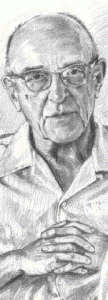The Person-Centred Approach (PCA)
of Carl R. ROGERS
This psychological and psychotherapeutic approach is renowned and spread all over the world. It has a high level of philosophical background and is supported by empirical research.
It is based on the postulate of the actualizing tendency. This is the basic energy active in every living being, pushing for growth and fulfilment.
The actualizing tendency can be damaged, hold back, and prevented from its natural action, which causes physical and psychological problems: if a person is not like she is supposed to be and as she wants to be. This distortion is the reason for psychological distress.
The role of the psychotherapist is to create a climate which allows the actualizing tendency in the client to come into full being and to be active, so that the client enters again in accordance / harmony with himself.
The creation of this climate is realized by the quality of the therapeutic relationship, which can be understood through the three basic attitudes:
– authenticity (the therapist is present as a real person)
– unconditional positive regard (the person is always accepted as a growing being, not judged for the behaviour)
– empathy (the therapist is always eager to understand the client as completely as possible and to express this understanding).
Becoming a person-centred therapist means to experience the helping position in trainings during 4 or 5 years in various sessions and situations. The future therapist learns to know his own reactions face to clients and to influence his own process of being a person, and not to influence the client with his own values, fears, and opinions. Anyway, being a therapist is a life-long learning process…
If you search for more complete information about the person-centred approach, please consult http://www.adpca.org/node/19. I would also encourage you to read a book written by Carl Rogers, whose writings are very clear and understandable.
The PCA is represented in Europe by PCE Europe, and in the world by the WAPCEPC organisation.


